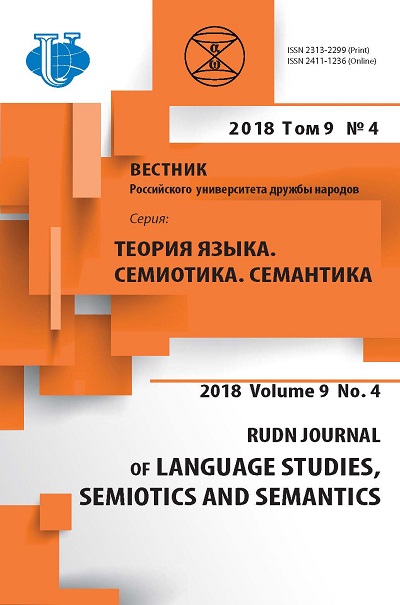THE RUSSIAN SONGS BY ANTON DELVIG: THE PROBLEM OF PRESERVING NATIONAL SPECIFICITY IN ENGLISH TRANSLATIONS
- Authors: Nenarokova M.R1
-
Affiliations:
- A.M. Gorky Institute of World Literature of the Russian Academy of Sciences
- Issue: Vol 9, No 4 (2018)
- Pages: 795-811
- Section: LANGUAGE HISTORY
- URL: https://journals.rudn.ru/semiotics-semantics/article/view/20139
- DOI: https://doi.org/10.22363/2313-2299-2018-9-4-795-811
- ID: 20139
Cite item
Full Text
Abstract
The article focuses on the problem of reproducing the national specificity of a text in translation. The object is the “Russian songs” by Anton Delvig, stylized as folk songs. They were created with the use of poetic means of Russian folklore. The subject is the peculiarities of reproducing national specificity, typical of Delvig’s poems, in English translations. The following texts were analyzed: translations of “Nightingale”, “Sang and sang a bird...”, “Ah, you, night...”, “Tis not autumn’s drizzly rain...”. The translations were carried out both by English and Russian native speakers. The main objective of the research is to determine what artistic means can convey the national features in a text. The tasks of the study were: to describe conveying metrics; to outline the key words of the poem, describe discrepancies in their translation, еxplain, why the variant, chosen by a certain translation, is possible or impossible in translating Delvig's text; indicate how the translators reproduce the artistic means of Russian folk songs in English. The continuous sampling method, the descriptive one, the componential one, the conceptual one, the contextual one, that of collocation were used in the course of the study. The study showed that translators preserve the national specifics of the original by creating a stylization in their own language. In the case of Delvig’s “Russian songs” the palette of artistic means, conveying national specificity, was developed in the course of a century and a half. It includes archaisms, repetitions and parallelisms, re-creating formulas or creating analogues within the receiving culture. An important means of conveying the national specificity of the text is its rhythm. Accurate conveyng of the rhythm pattern helps the reader to get the same impression from the translation as from the original, and can even mask errors in the reproduction of content.
About the authors
Maria R Nenarokova
A.M. Gorky Institute of World Literature of the Russian Academy of Sciences
Author for correspondence.
Email: maria.nenarokova@yandex.ru
Doctor of Philology, Leading Researcher of A.M.Gorky Institute of World Literature of the Russian Academy of Sciences; Interests: history of Medieval Culture, Medieval Latin literature, Medieval education; English, Danish, Russian Literature of Romanticism; Russian Orthodox Spirituality, Russian Culture of the 19th century; the language of flowers; comparative studies, translation and interpretation studies
25A, Povarskaya str., Moscow, Russia, 121069References
- Vengranovich, M.A. (2011). The Stylistics of a Folclore Text. A Manual. Tolyatti: TGU. (In Russ.).
- Tomashevsky, B.V. (1959). A.A. Delvig. In Delvig, A.A. The Complete Poetic Works. Leningrad, the Soviet Writer. pp. 5—58. (In Russ.).
- Vatsuro, V.E. (1986). Anton Delvig as a man of letters. In Delvig, A.A. The works. Poems. Articles. Letters. Compilation, commentaries. Leningrad: Hudozhestvennaja literatura. pp. 3—20 (In Russ.).
- Vatsuro, V.E. (1989). S.D.P. From the History of the Literary Daily Life of Pushkin’s Time. Moscow: The Book. (In Russ.).
- Plotkin, L. (1951). A.A. Delvig. In A. Delvig. Poems. A Poet’s Library. The Little Series. Leningrad: The Soviet Writer. pp. 5—52. (In Russ.).
- Koehler, L. (1970). Anton Antonovic Del’vig. A Classicist in the Time of Romanticism. The Hague-Paris, Mouton.
- Zhatkin, D.N. (2005). A.A.Delvig’s Poetry in the context of the literary evolution in 1810—1830 (traditions and innovations) [dissertation]. Moscow. (In Russ.).
- Delvig, A.A. (1986). The works. Poems. Articles. Letters. Compilation, commentaries, introduction by V.E. Vatsuro. Leningrad: Hudozhestvennaja literatura. (In Russ.).
- The North American Review, 1836. pp. 85—120.
- Delvig, A.A. (1836). The Faithless Lover. In: Slavic Popular Poetry. The North American Review, 1836. pp. 85—120.
- Delvig, A.A. Nightingale. Tr. Alexander Sharkovsky. 2011 URL: http://www.obshelit.ru/ works/207978 (accessed: 17.08.2018).
- Delvig, A.A. Nightingale Mine.Tr. Lyudmila Purgina. 2012. URL: https://www.poemhunter.com/ poem/a-delvig-nightingale-mine-the-romance-translation-rus/ (accessed: 17.08.2018).
- Davis, Alexis. Selected Russian Classical Romances and Traditional Songs for Young Singers: Introductory Materials with Teaching Strategies. ARIZONA STATE UNIVERSITY December 2014. URL: https://repository.asu.edu/../Davis_asu_0010E_14543.pdf (accessed: 17.08.2018).
- Delvig, A.A. (2014). Nightingale. Tr. Edward Leitman. URL: https://www.stihi.ru/2014/01/20/8469 (accessed: 17.08.2018).
- Delvig, A.A. Russian song. Tr. Peter France. The Penguin Book of Russian Poetry. Robert Chandler, Irina Mashinski, Boris Dralyuk, 2015 URL: https://books.google.ru/books?isbn=0141972262 (accessed: 17.08.2018).
- Delvig, A.A. Nightingale. Tr. A. Laskavtsev. 2016. URL: https://lyricstranslate.com/ru/% D1%81%D0%BE%D0%BB%D0%BE%D0%B2%D0%B5%D0%B9-%D0%BC%D0%BE% D0%B9-nightingale.html (accessed: 17.08.2018).
- Simpson, J, Roud, S. A Dictionary of English Folklore. Oxford University Press, 2000. P. 411.
- Delvig, A.A. Russian song (The song that once trilled many a lay..). Wilson C.T. Russian Lyrics in English Verse. L, Trübner & CO, 1881.
- Delvig, A.A. Russian song (Sang a little bird..). A Second Book of Russian Verse. Tr. C.M. Bowra. L, MacMillan &Co LTD, 1948. рр. 14—15.
- Delvig, A.A. Russian song (Ah, you night..). A Second Book of Russian Verse. Tr. C.M. Bowra. L, MacMillan &Co LTD, 1948. рр. 13—14.
- Delvig, A.A. ’Tis not autumn’s drizzly rain.. The Luminaries of the Odd Pleiad (from D. Venevitinov till P. Vyazemsky). Tr., notes A. Pokidov. Moscow, 2013. URL: pokidovpoetry.ru›THE_LUMINARIES.pdf (accessed: 17.08.2018).
Supplementary files












